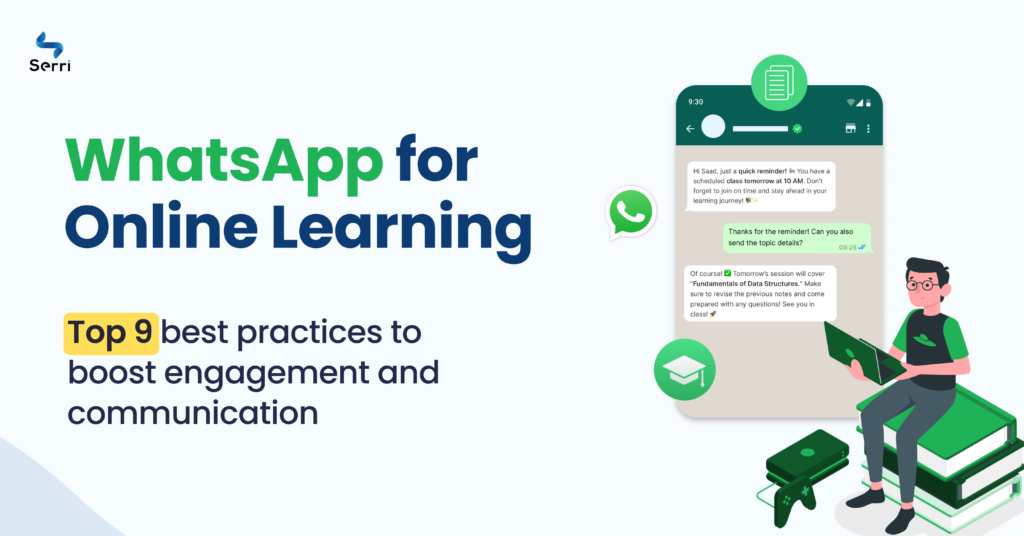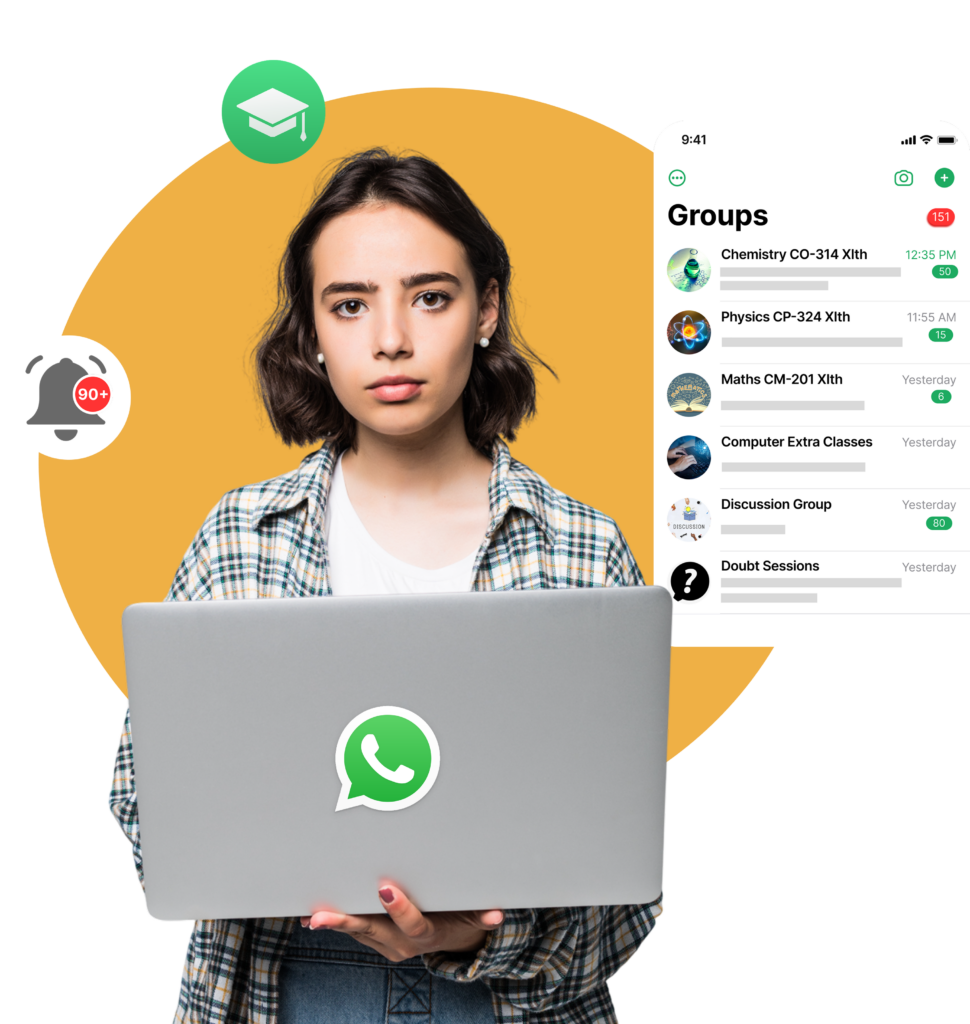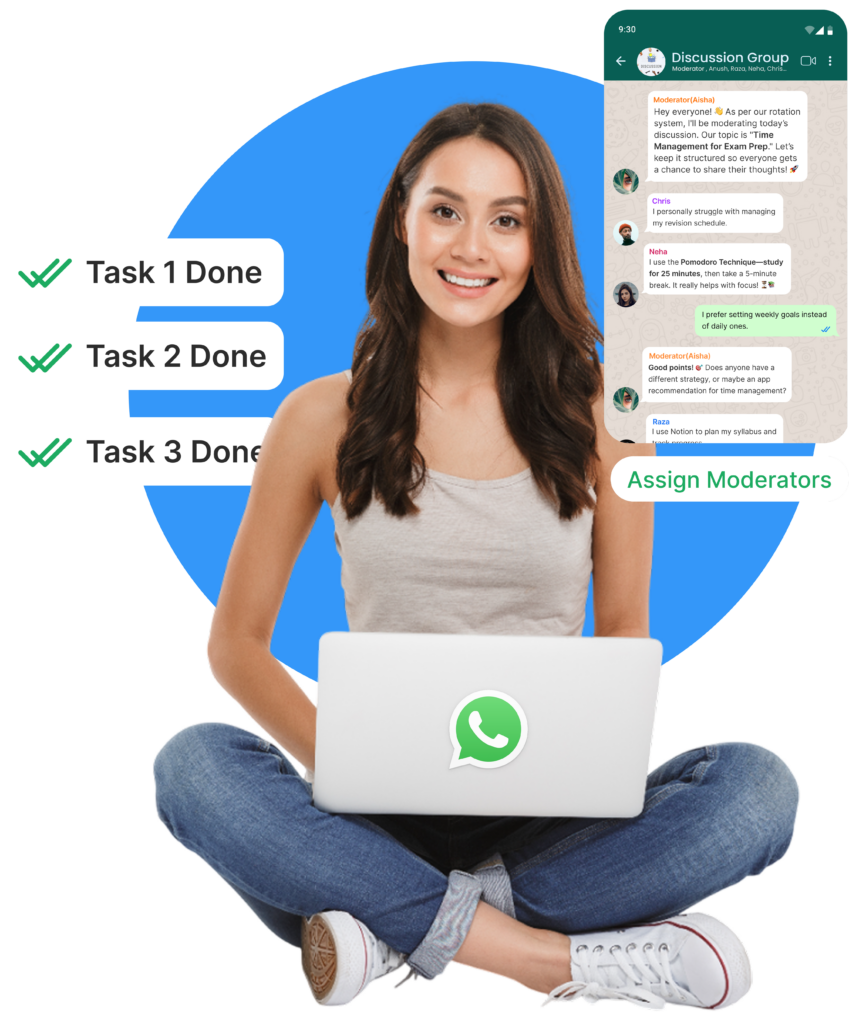
WhatsApp E-learning has emerged as a powerful tool to enhance engagement. It offers instant communication and collaboration between students, teachers, and parents. By leveraging WhatsApp for Education, institutions can simplify administrative tasks and improve learning experiences through real-time interaction.
WhatsApp Business API for Education

The WhatsApp Business API offers advanced features tailored for larger organizations, including educational institutions. It enables automated messages, customer service chatbots, and integration with other systems.
Benefits of WhatsApp Business API for Educational Institutions
Automated Announcements
Keep students on track with reminders about assignments, upcoming due dates, and lesson plans.
Improved Communication
Improve communication between teachers, students, and parents for a more connected learning experience.
Data analysis
Gain valuable insight into the networking process and engagement process to understand better and support your students.
Top 9 Best Practices for Leveraging WhatsApp in Education
WhatsApp is not just for chatting anymore, you can leverage it and achieve many things here are some best practices.
1. Group Chats for Classes

Creating group chats for different subjects or projects helps everyone stay on the same page. It’s perfect for sharing resources, discussing assignments, and building a community.
2. Multimedia Sharing
Sharing videos, photos, and voice notes makes learning more engaging. Teachers can send multimedia lessons, and students can get instant feedback.
3. Gamified Learning Activities
Incorporating gamification elements into WhatsApp Elearning can significantly boost student engagement. Teachers can create interactive quizzes, leaderboards, and challenges within WhatsApp groups to encourage active participation.
4. Real-Time Updates
Teachers can send real-time updates about schedule changes or upcoming tests, ensuring students get important information immediately.
5. Virtual class hours
Teachers can create virtual class hours on WhatsApp, allowing students to ask questions and seek help outside of class time.
6. Personalized Learning Paths with WhatsApp
Using WhatsApp for Education, educators can create personalized learning paths for students based on their progress and understanding.
7. One-on-One Student Mentorship via WhatsApp
Incorporating personalized mentorship through WhatsApp for Education allows students to receive individualized guidance and support from teachers.
8. Discussion and teamwork
WhatsApp encourages teamwork by allowing students to quickly share ideas and work on team projects within the app.
9. Encouraging Parental Involvement
Teachers can create parent groups to keep them updated on their child’s progress and school activities, leading to better engagement and communication.
Challenges of Using WhatsApp for Online Learning
1. Managing Group Size and Participant Engagement
When the group size is over fifty it is difficult to coordinate, all the students may not be active and feel overloaded with information, which leads to disengagement between students.
2. Privacy And Data Security
While WhatsApp offers end-to-end encryption, privacy concerns remain, particularly regarding the sharing of personal information and educational data. Teachers must be cautious about what they share and how they manage sensitive information.
3. Maintaining Focus
The informal nature of WhatsApp may lead to distractions, with students using the app for personal conversations instead of focusing on learning.
Overcoming Challenges in WhatsApp-Based Learning

1. Setting Clear Expectations and Objectives
Communicate the purpose of the WhatsApp group and set learning objectives. This helps students understand the value of the platform and encourages them to stay focused on their educational goals.
2. Implementing Moderation and Participation Guidelines
Assign moderators or use rotation systems where students take turns leading discussions. This encourages accountability and helps maintain order in larger groups.
3. Encouraging Responsible Use of the Platform
Educate students on responsible digital communication. This includes respecting privacy, avoiding off-topic conversations, and maintaining a professional tone in the group chat.
Conclusion: WhatsApp is the Future of Education
Using WhatsApp for education can boost the learning and teaching experience. It’s easy to use, has a broad reach, and offers diverse features that make it great for educational communication. By tackling its challenges and leveraging its strengths, we can create engaging learning spaces for everyone.
Solutions like Serri enhance this by helping educational institutions manage their WhatsApp communications efficiently. With features like automated replies and organized contacts, Serri allows educators to focus on teaching.

FAQs
1. Is WhatsApp a Secure Platform for Online Learning?
Yes, WhatsApp is secure due to its end-to-end encryption, ensuring that messages and files shared within the app are protected from unauthorized access.
2. Can WhatsApp Replace Traditional Learning Management Systems?
While WhatsApp is a great supplementary tool, it may not completely replace traditional LMS platforms, which offer more comprehensive features like grade tracking and detailed course management.
3. What Are the Limitations of Using WhatsApp for Education?
Some limitations include managing large groups, potential distractions, privacy concerns, and the lack of certain LMS features like grade books or course content repositories.
4. How Can WhatsApp Be Used for Assessments and Exams?
WhatsApp can be used for informal assessments, such as quizzes, assignments, and reflective discussions, but it may not be suitable for formal, high-stakes exams.